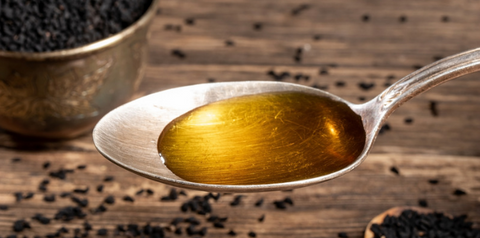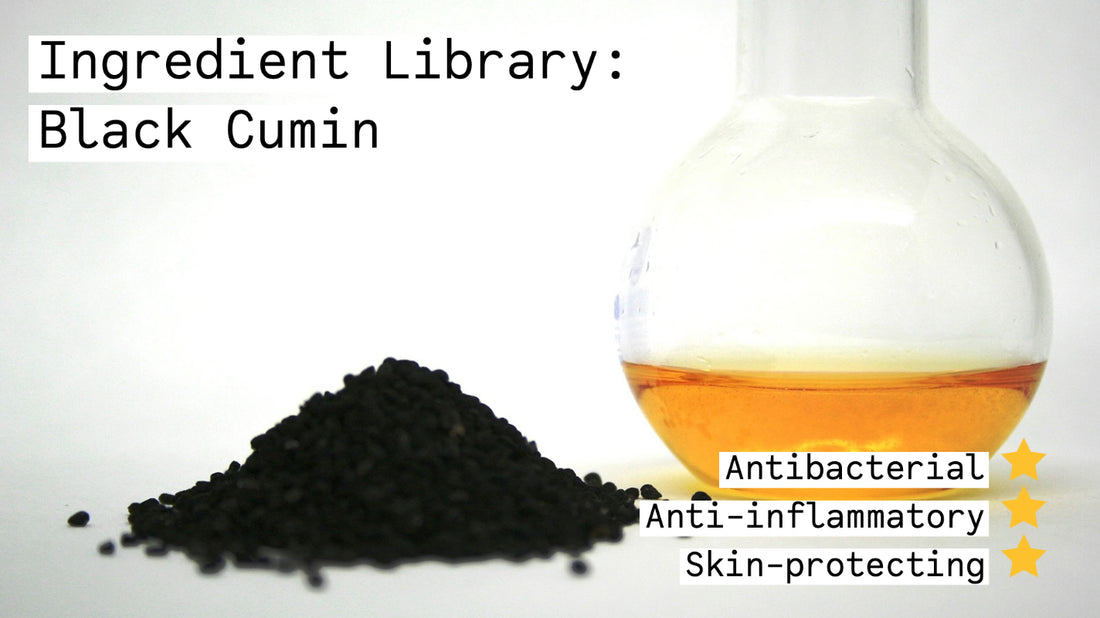If you’re a skincare buff, chances are you’ve seen black cumin seed oil plastered all over the internet and (hopefully) on the back of your favorite skincare products. To put it bluntly, black cumin seed oil has been making a splash in the skincare realm for an excellent reason: It’s basically the key to fighting acne. In this blog, we’ll get candid on all things black cumin seed oil, including its insanely rich history and impressive skincare benefits.
A Step Back in Time: Black Cumin Seed Oil Edition
Pictured: Ancient Painting Different Oils, Including Black Cumin Seed Oil Source: Ink and Ocean
Different from culinary cumin, black cumin seed oil comes from the Nigella sativa plant that's sometimes called black caraway or fennel flower. Black cumin seed oil’s past is as rich as the oil itself; starting nearly 3000 years, it was applied as an herbal remedy for aches and topical irritations (like insect bites, sores, inflammation, and rashes).
It’s believed that black cumin seed oil was first used by the Assyrians of ancient Egypt. In fact, for ancient queens Cleopatra and Nefertiti, black cumin seed oil was the “it girl” ingredient that really jazzed up their skincare routines and beautifying baths. Moving across the map, historians also suspect that first century Greek physicians used black cumin seed oil.
Hippocrates, for example, utilized the power of black cumin seed oil to address toothaches, nasal congestion, and intestinal worms. In “The Book of Healing,” which was completed in 1002 CE, author and physician Ibn Sina noted black cumin seed oil as an agent for boosting energy and alleviating weakness, exhaustion, sadness, and feelings of discouragement.
Who knew black cumin seed oil had such a vivacious history?
The Skincare Benefits of Black Cumin Seed Oil (Yes, It Can Give Acne the Boot!)

Pictured: Black Cumin Seed Oil Source: Fox8
Black cumin seed oil is bursting with omega-3,-6, and -9 essential fatty acids, along with cholesterol-lowering compounds called phytosterols. However, the vast majority of black cumin seed oil's perks have to do with the ultra-potent active compound known as thymoquinone, which is an antioxidant, anti-inflammatory, and anti-allergen. Here’s a more in-depth look at some of the skincare benefits of black cumin seed oil:
Black Cumin Seed Oil Is Antibacterial and Anti-Inflammatory
Blemishes are often caused by bacteria, so it shouldn’t be a shocker that black cumin seed oil’s antibacterial properties can help banish those pesky pimples and blackheads. In fact, a 2015 study found that applying a product formulated with black cumin seed oil significantly (and positively) affected acne-prone skin after two months. It was also noted in the study that black cumin seed oil helped to reduce post-acne scarring.
Black Cumin Seed Oil Can Fade Dark Spots (Especially Those Relating to Acne)
One of the worst things about dealing with a breakout is the dark spots that often piggyback acne. However, things like sun damage and hormonal changes can also cause dark spots to appear. Thankfully, black cumin seed oil is a potent ingredient to fade dark spots over time (no matter their cause). This is because black cumin seed oil is brimming with vitamin A, amino acids, and fatty acids that may help to regenerate skin cells.
Black Cumin Seed Oil Helps Support the Endocannabinoid System
The endocannabinoid system is basically the body’s “master regulatory system,” and it just so happens that black cumin seed oil supports it really well. "Black cumin seed oil contains a key phytocannabinoid called beta-caryophyllene (BCP). BCP binds exclusively to the CB2 cannabinoid receptor. This receptor dominates in the peripheral nervous system, immune system, gut, liver, skin, and bones — so supporting it is important to maintaining health in these systems," explains Robert Rountree, M.D., a functional medicine pioneer.
If you’re an endocannabinoid system newbie, you can read a more in-depth description of it (and CB2 receptors) here!
Black Cumin Seed Oil Does More?
While we live for what black cumin seed oil can do for acne, that's not all it's good for. If you’re one of the 30% of Americans suffering from skin conditions like eczema, black cumin seed oil could be your saving grace as it’s known to improve the look and feel of the skin condition.
If fine lines and wrinkles are more of a concern for you, then we have good news: Black cumin seed oil is packed with vitamins A, B, and C, which help the skin retain moisture and maintain elasticity. Plus, this nourishing, fatty acid-rich oil even fills in fine lines and minimizes the appearance of wrinkles.
What can’t black cumin seed oil do?
Let's Get Blunt About Black Cumin Seed Oil, Acne, and More

Black cumin seed oil is an ancient magical ingredient that’s making a serious comeback, and at Blunt Skincare, we’re here for its resurgence! In fact, to help you boast all of the exceptional benefits mentioned above, we formulated our Blunt Skincare Isolate Pure CBD Balancing Face Oil with black cumin seed oil, making it a must-have for anyone with oily, combination, and blemish-prone skin. Do you have any black cumin seed oil questions? Comment below and we’ll gladly answer them. Remember: We will always be 100% blunt with you!
References:
1. Hannan MA, Rahman MA, Sohag AAM, Uddin MJ, Dash R, Sikder MH, Rahman MS, Timalsina B, Munni YA, Sarker PP, Alam M, Mohibbullah M, Haque MN, Jahan I, Hossain MT, Afrin T, Rahman MM, Tahjib-Ul-Arif M, Mitra S, Oktaviani DF, Khan MK, Choi HJ, Moon IS, Kim B. Black Cumin (Nigella sativa L.): A Comprehensive Review on Phytochemistry, Health Benefits, Molecular Pharmacology, and Safety. Nutrients. 2021; 13(6):1784. https://doi.org/10.3390/nu13061784
2. Khader M, Eckl PM. Thymoquinone: an emerging natural drug with a wide range of medical applications. Iran J Basic Med Sci. 2014 Dec;17(12):950-7. PMID: 25859298; PMCID: PMC4387230.
3. Tavakkoli A, Mahdian V, Razavi BM, Hosseinzadeh H. Review on Clinical Trials of Black Seed (Nigella sativa ) and Its Active Constituent, Thymoquinone. J Pharmacopuncture. 2017 Sep;20(3):179-193. doi: 10.3831/KPI.2017.20.021. Epub 2017 Sep 30. PMID: 30087794; PMCID: PMC5633670.
4. Yimer EM, Tuem KB, Karim A, Ur-Rehman N, Anwar F. Nigella sativa L. (Black Cumin): A Promising Natural Remedy for Wide Range of Illnesses. Evid Based Complement Alternat Med. 2019 May 12;2019:1528635. doi: 10.1155/2019/1528635. PMID: 31214267; PMCID: PMC653588



1 comment
My family have used Nigella for decades – it’s almost like a home first aid kit for so many problems. It’s a wonder that it doesn’t get more coverage – it certainly is worthy of it.